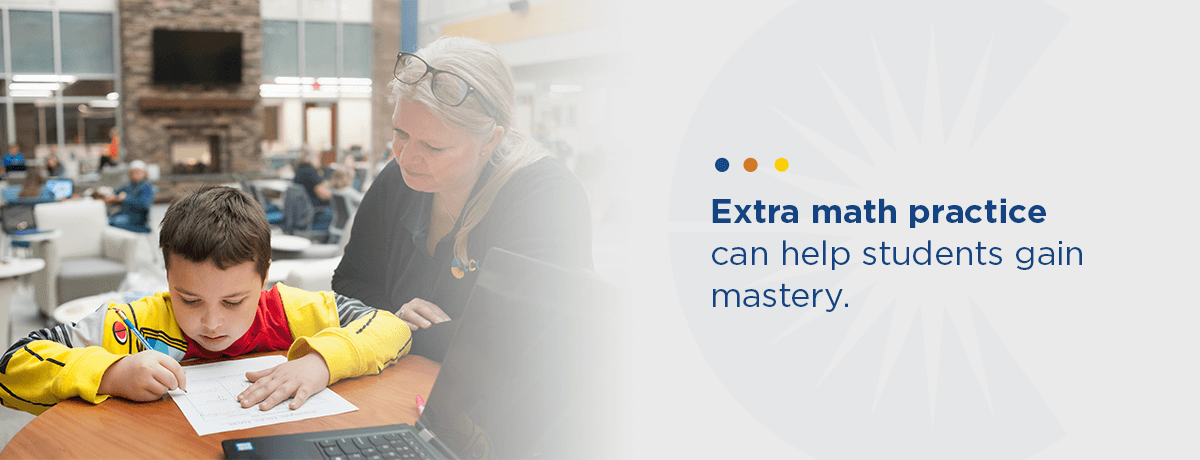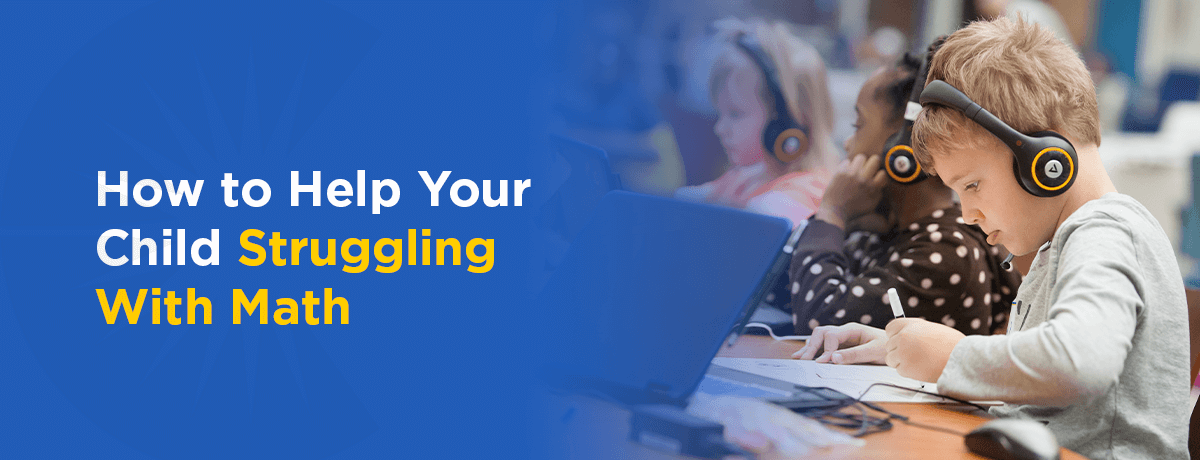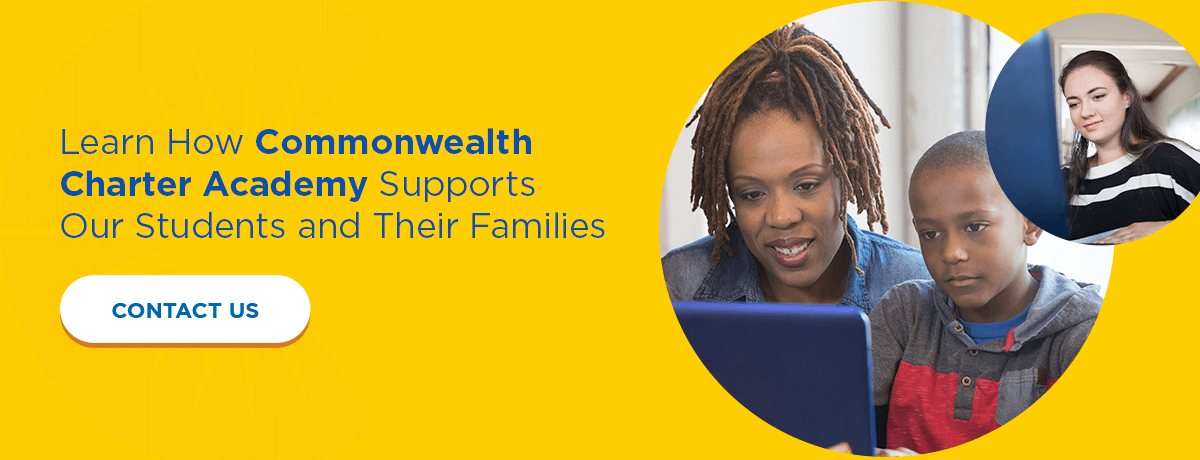Math can be a challenging topic for anyone, and math disabilities can occur at any age or grade level. These issues can stem from learning deficits and wide-ranging environmental and developmental causes. No matter your child’s age, if you notice them struggling, there are many ways to help your child with math at home. The activities and methods you use will depend on your child’s age, grade level, and what topics they are studying, but the good news is lots of great ideas are available to help.
Early Elementary (K-2)
Math builds upon itself, so success with foundational math topics in the early elementary years will only make later concepts seem more approachable. In kindergarten through second grade, students learn math fundamentals, like taking measurements, telling time, and counting money.
At this age, learning math goes beyond rote memorization. Developing specific skills can set up a student for success later in school. You can help your child foster a growth mindset — a positive way of thinking that helps kids tackle challenges such as schoolwork. Practicing study habits may include keeping the study area and schoolwork supplies clean and organized, and learning to write neatly so math work is easier to read and keep track of. Incorporate math into your daily life, showing your child its value and usefulness in daily life. Allow them to help at the grocery store with age-appropriate tasks like counting items and estimating costs.
If your child is struggling with math at this age, one of the best things you can do is make the subject fun and exciting. Be positive and encouraging, and give your child lots of extra practice so that they get the foundations down. Try some of these mathematical activities to do with your child:
- Use drawings and manipulatives to help visualize math problems.
- Practice facts with flashcards.
- Play store at home.
- Make a giant number line outside with chalk, or inside with painters’ tape.
- Search math games online for tons of fun ideas.
Upper Elementary (3-5)
Math in the upper elementary grades builds on the foundations established in the first few years, learning multiplication and division and incorporating larger numbers, more complicated word problems, and critical thinking activities. Helping your child with math at home should still involve plenty of encouragement and fun at these ages.
Extra math practice can help students gain mastery. Encourage your child to do more than the minimum assigned work, and help them by using flashcards, speed tests, and fun math activities. As with the earlier years, there are plenty of online ideas for fun games that strengthen math skills.
Upper elementary students usually find it hard to resist electronic devices like tablets and laptops, and you can use this to your advantage in promoting math activities. Screen time can be educational and fun. Use math videos to help reinforce concepts and lend visual elements to your child’s studies. You could also consider a subscription service for educational content. These services provide printable worksheets, project ideas, and online games. With these, many children feel like they’re playing video games when they are working on their math skills!

Middle School (6-8)
In middle school, math classes start getting a little more complex and fast-paced. Continue to be positive and encourage a growth mindset for your child. By this point, your student has covered many different math topics and may even have several math class options at school. If your child is struggling with math, it’s paramount to identify the problem areas, focus your approach, and meet your child where they need help most.
At this age, simple games may be less engaging. However, you may find some age-appropriate games that practice math skills. Providing extra practice problems gives your child a chance to work on their skills. Another excellent option for this age group is extra tutoring and math clubs. Talk with your child’s teacher or school administrator about what your school offers. You can seek private tutoring or online groups outside school, too. CCA has several math clubs and groups for kids to explore and get in some extra math practice, all while having fun and socializing.
High School (9-12)
High school math can be incredibly challenging for students and parents alike, and struggles at this age are typical. High schoolers may have the opportunity to take math classes based on their differing abilities and interests. Most high schools require at least three years of math classes, including algebra and geometry. Other advanced courses like trigonometry, calculus, and statistics may also be available. Some parents may struggle to help their child at these levels, and may need to relearn some of the topics alongside their child. Often, getting an online or in-person tutor is the best idea.
Here’s how to help your child with math at home for several typical high school requirements.
- Algebra: Algebra can seem intimidating at first, but is fundamental for learning any other upper-level math subjects. Ask your child to think out loud and explain their processes. That way, you’ll get a refresher course while your child gets some extra practice and deeper understanding. Look for online resources and tutoring opportunities for extra help.
- Geometry: In geometry, don’t be afraid to go back to the basics to help your child have a better foundation to build from. Use online resources and printables for extra practice at home, and arrange a tutor if necessary.
- Statistics: Even in advanced statistics, using some simple games and activities can be beneficial. Let your child gather data, and use simple models like candies or beans for finding statistical values. You can find more fun activities and other support methods online.
- Trigonometry: While trigonometry builds on earlier math concepts, the terminology and complex problems can be confusing. It’s helpful to study the basics and get in extra practice at home. Engage a tutor or ask your child’s teacher about other resources.
Learn How Commonwealth Charter Academy Supports Our Students and Their Families
At CCA, we support families and learners of diverse backgrounds and learning methods. If a student is struggling academically or personally, we are here to help them through it. Our student-centered, customized curriculum and flexible style are ideal for all learners — advanced learners can move more quickly through the material, and those having trouble with topics can get extra help.
Are you ready to find out more about how CCA could be right for your family? Contact us today — we can answer any questions you have and get you started with online learning.




